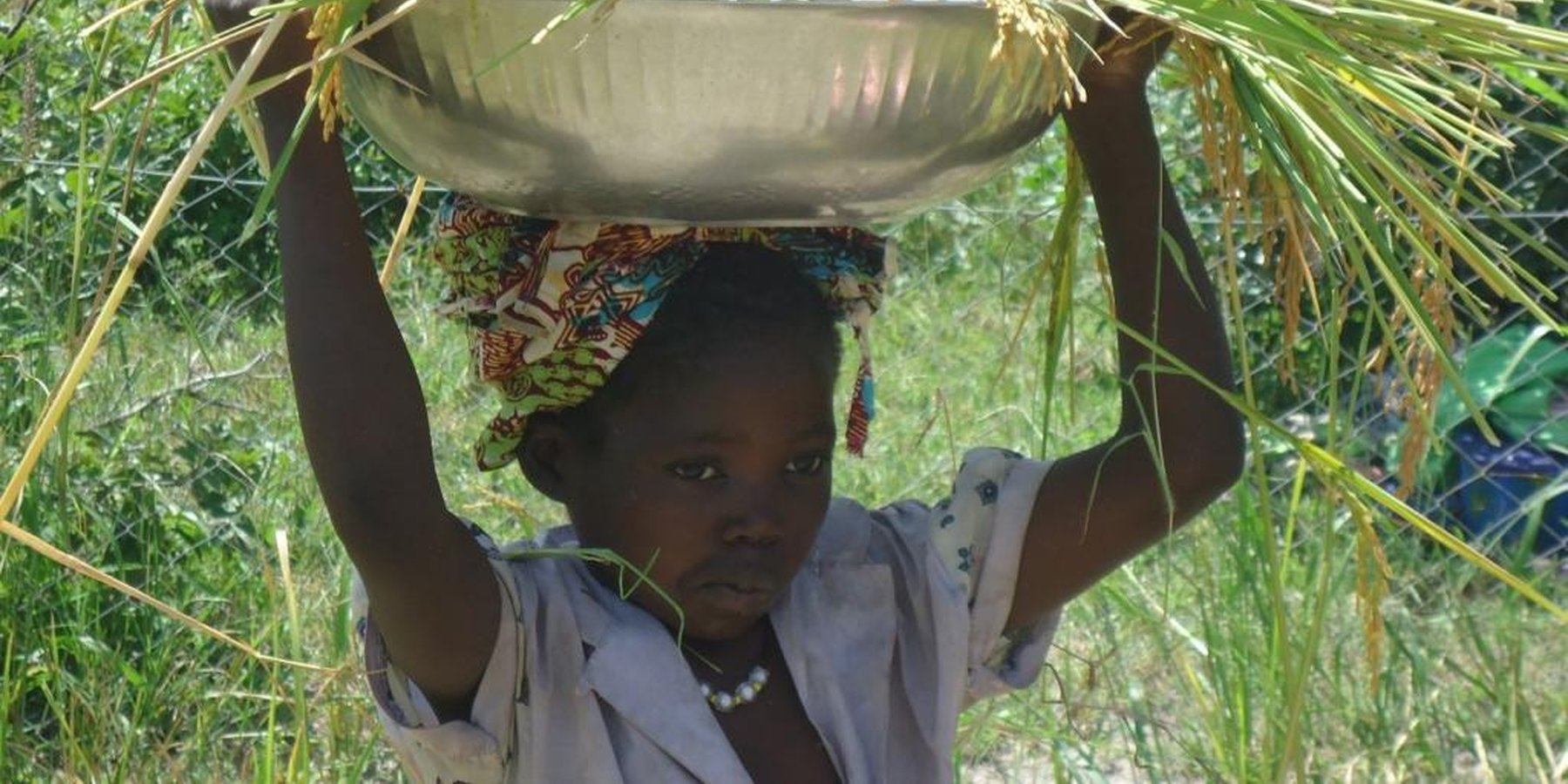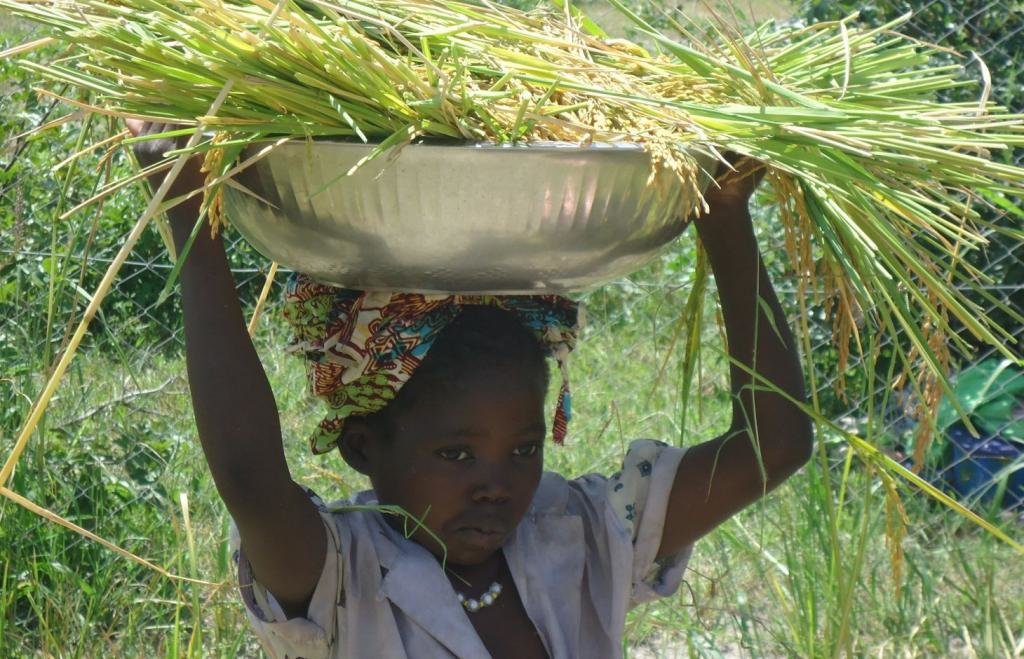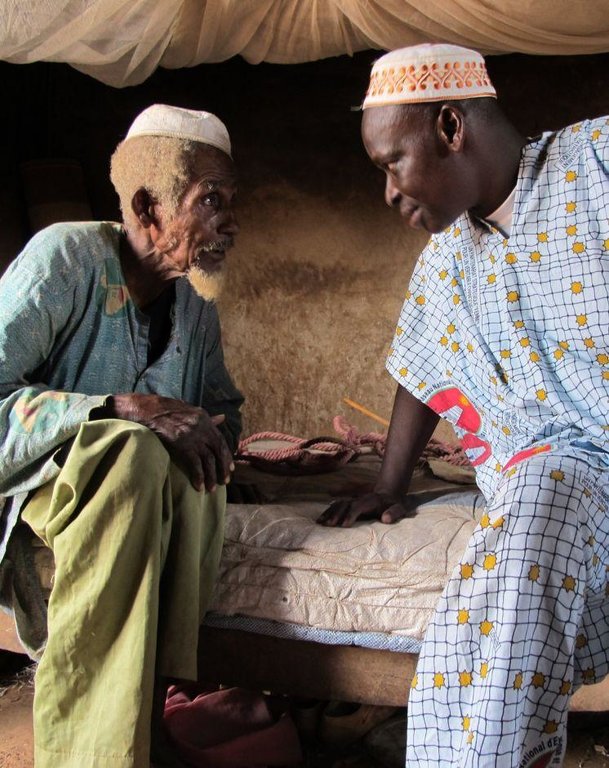Agricultural credit and start-up funding for small-scale irrigation cooperatives [Mali]
- Creación:
- Actualización:
- Compilador: Dieter Nill
- Editor: –
- Revisor: Laura Ebneter
Crédit agricole et fonds de démarrage pour les coopératives dans l’irrigation de proximité
approaches_2508 - Mali
Visualizar secciones
Expandir todo Colapsar todos1. Información general
1.2 Detalles de contacto de las personas de referencia e instituciones involucradas en la evaluación y la documentación del Enfoque
Especialista MST:
Dembele Célestin
celestin.dembele@helvetas.org
HELVETAS - Swiss Intercooperation
Mali
Especialista MST:
Doumbia Moussa
mtdoumbia@yahoo.fr
Association for the Development and Protection of the Environment (ADEPE Mali)
Mali
Tamini Jacques
jacques.tamini@helvetas.org
HELVETAS - Swiss Intercooperation
Mali
Nombre de la(s) institución(es) que facilitaron la documentación/ evaluación del Enfoque si fuera relevante)
Deutsche Gesellschaft für Internationale Zusammenarbeit (GIZ) GmbH (GIZ) - AlemaniaNombre de la(s) institución(es) que facilitaron la documentación/ evaluación del Enfoque si fuera relevante)
HELVETAS (Swiss Intercooperation)1.3 Condiciones referidas al uso de datos documentados mediante WOCAT
¿Cuándo se compilaron los datos (en el campo)?
01/07/2012
El compilador y la/s persona(s) de referencia claves aceptan las condiciones acerca del uso de los datos documentados mediante WOCAT :
Sí
2. Descripción del Enfoque MST
2.1 Breve descripción del Enfoque
Providing lowland farmer cooperatives with self-managed, self-renewing financial resources for the purpose of facilitating members’ access to farming inputs.
2.2 Descripción detallada del Enfoque MST
Descripción detallada del Enfoque MST:
Once the infrastructure has been put in place, cooperatives are supported in drawing up their cropping plans (rice and vegetable growing). This support is provided in the context of value enhancement. The cropping plans include forecasting in relation to sites and the input needs of member farmers. The funds provided by the project are targeted towards supporting the empowerment of cooperatives and constitute non-repayable grants. Cooperatives use these financial resources to provide their members with loans to grow crops. When these crops are sold, the loans are repaid to the cooperatives along with a small percentage of interest to renew the loan facility. The loan awarding system, interest rates and repayment deadline are clearly defined by the cooperative. Women have access to gender-specific mechanisms, such as a facility to access credit without providing any personal contribution. The grant is awarded following a capacity-building process focusing on the management and governance of the cooperative. Following negotiations, the programme funds the cooperative’s cropping plan on the basis of a collaboration agreement. Support with managing the funds is delivered by a consultant. The grant is paid into the cooperative’s bank account. The cooperative organises the procurement of inputs, in collaboration with the service provider. Loans are provided in kind (seed, fertilisers, pesticides, etc.) rather than as cash. Those tasked with managing the cooperative are given training in how to use a range of management tools (drawing up cropping plans; keeping stock inventory, loan and repayment records; managing removal and delivery receipts; etc.). At the end of the growing season, the loans are repaid in kind (seed) and in cash (fertilisers and fungicides) in accordance with a predetermined timetable, thus replenishing the fund.
The structuring, organisational strengthening and management capacity building activities are delivered by the consultant from the outset of the scheme’s implementation phase. Groups of actors are encouraged to organise themselves as cooperatives (women and men rice growers, vegetable and other kinds of growers, etc.). These cooperatives, with the support of the consultancies, act as the representative for managing funds. They draw up their cropping plans (list of member producers and their farmland, and evaluation of the input requirements requested by producers) and define the system for awarding loans (the access conditions, repayment methods, timetables and interest levels are set by the cooperatives). An agreement setting out the ways in which the programme will provide support through a contracted service provider is signed. Funds are paid into the relevant bank account and the cooperative then procures the inputs. The cooperative managers, using the management tools at their disposal, distribute the inputs to producers. A public audit is organised to inform members about the status of loans. The recovery of loans with interest makes it possible to replenish the fund (with payments paid into the cooperative’s bank account). The public audit into the loan repayment situation is a medium for deploying coercive measures to recover unpaid loans.
The cooperatives catalogue needs, coordinate the preparation of the cropping plan, set the access conditions for loans, undertake procurement and ensure the recovery of loans from members. The communes participate in debriefings, facilitate the settlement of misunderstandings between producers and cooperatives, and monitor technical support provision. The intermunicipal body facilitates communication and negotiation between communes and the programme. Consultancies deliver management training and advisory support on technical aspects of farming, and facilitate the procurement of inputs suited to the farming condition of each site. Technical services participate in evaluation meetings and act as advisors to the service providers and programme team.
2.3 Fotos del Enfoque
2.5 País/ región/ lugares donde el Enfoque fue aplicado
País:
Mali
Región/ Estado/ Provincia:
Mali
Especifique más el lugar :
Bougouni, Kolondiéba, Yanfolila
2.6 Fechas de inicio y conclusión del Enfoque
Indique año del inicio:
2008
2.7 Tipo de Enfoque
- proyecto/ basado en un programa
2.8 Propósitos/ objetivos principales del Enfoque
Providing lowland farmer cooperatives with self-managed, self-renewing financial resources for the purpose of facilitating members’ access to farming inputs.
The SLM Approach addressed the following problems: lack of cash to invest in SLM
2.9 Condiciones que facilitan o impiden la implementación de la/s Tecnología/s aplicadas bajo el Enfoque
disponibilidad/ acceso a recursos y servicios financieros
- impiden
lack of cash to invest in SLM
Treatment through the SLM Approach: Providing lowland farmer cooperatives with self-managed, self-renewing financial resources for the purpose of facilitating members’ access to farming inputs.
3. Participación y roles de las partes interesadas involucradas
3.1 Partes interesadas involucradas en el Enfoque y sus roles
- usuarios locales de tierras/ comunidades locales
- especialistas MST/consejeros agrícolas
- ONG
- gobierno local
- gobierno nacional (planificadores, autoridades)
3.2 Involucramiento de los usuarios locales de tierras/ comunidades locales en las distintas fases del Enfoque
| Involucramiento de los usuarios locales de tierras/ comunidades locales | Especifique quién se involucró y describa las actividades | |
|---|---|---|
| iniciación/ motivación | pasivo | |
| planificación | interactivo | |
| implementación | interactivo | |
| monitoreo y evaluación | interactivo | |
| Research | pasivo |
3.4 La toma de decisiones en la selección de Tecnología(s) MST
Especifique quién decidió la selección de las Tecnología/ Tecnologías a implementarse:
- principalmente usuarios de tierras con el apoyo de especialistas MST
Explique:
Decisions on the method of implementing the SLM Technology were made by mainly by land users supported by SLM specialists
4. Apoyo técnico, fortalecimiento institucional y gestión del conocimiento
4.1 Construcción de capacidades / capacitación
¿Se proporcionó la capacitación a usuarios de tierras/ otras partes interesadas?
Sí
Especifique quién fue capacitado:
- usuarios de tierras
- personal de campo/ consejeros
Forma de capacitación:
- reuniones públicas
- cursos
Temas avanzados:
Consultancies deliver management training and advisory support on technical aspects of farming. Those tasked with managing the cooperative are given training in how to use a range of management tools (drawing up cropping plans; keeping stock inventory, loan and repayment records; managing removal and delivery receipts; etc.).
4.2 Servicio de asesoría
¿Los usuarios de tierras tienen acceso a un servicio de asesoría?
Sí
Especifique si servicio proporcionado se realizó:
- en los campos de los usuarios de tierras
Describa/ comentarios:
Name of method used for advisory service: Providing lowland farmer cooperatives with self-managed, self-renewing financial resources ; A local farming advisory mechanism active in the first few years of the scheme ensures high levels of productivity, which, in turn, facilitates the repayment of loans. Holding public audits to report on accounts ensures that the system is transparent.
Advisory service is quite adequate to ensure the continuation of land conservation activities
4.3 Fortalecimiento institucional (desarrollo institucional)
¿Se establecieron o fortalecieron instituciones mediante el Enfoque?
- sí, moderadamente
Especifique el nivel o los niveles en los que se fortalecieron o establecieron las instituciones:
- local
Especifique el tipo de apoyo:
- financiero
- construcción de capacidades/ entrenamiento
4.4 Monitoreo y evaluación
¿El monitoreo y la evaluación forman parte del Enfoque?
Sí
Comentarios:
socio-cultural aspects were ad hoc monitored by project staff through observations
economic / production aspects were ad hoc monitored by project staff, land users through measurements
management of Approach aspects were ad hoc monitored by project staff, land users through observations
There were no changes in the Approach as a result of monitoring and evaluation: None
There were no changes in the Technology as a result of monitoring and evaluation: None
4.5 Investigación
¿La investigación formó parte del Enfoque?
Sí
Especifique los temas:
- sociología
- economía/ marketing
- ecología
- tecnología
5. Financiamiento y apoyo material externo
5.1 Presupuesto anual para el componente MST del Enfoque
Comentarios (ej. fuentes principales de financiamiento/ donantes principales):
Approach costs were met by the following donors: international non-government: 100.0%
5.2 Apoyo financiero/material proporcionado a los usuarios de tierras
¿Los usuarios de tierras recibieron financiamiento/ apoyo material para implementar la Tecnología/ Tecnologías? :
Sí
Si respondió sí, especifique el tipo o los tipos de apoyo, condiciones y proveedor(es) :
The funds provided by the project are targeted towards supporting the empowerment of cooperatives and constitute non-repayable grants. Cooperatives use these financial resources to provide their members with loans to grow crops. When these crops are sold, the loans are repaid to the cooperatives along with a small percentage of interest to renew the loan facility. The loan awarding system, interest rates and repayment deadline are clearly defined by the cooperative. Women have access to gender-specific mechanisms, such as a facility to access credit without providing any personal contribution.
5.3 Subsidios para insumos específicos (incluyendo mano de obra)
Si la mano de obra de usuarios de tierras fue un insumo sustancial, ¿fue:
- recompensado con otro tipo de apoyo material?
Comentarios:
Loans are provided in kind (seed, fertilisers, pesticides, etc.) rather than as cash.
5.4 Crédito
¿Se proporcionó crédito bajo el Enfoque para actividades MST?
Sí
Especifique las condiciones (tasa de interés el apoyo, amortización, etc.):
repayment conditions: The funds provided by the project are used to buy inputs on the basis of the cropping plan. The start-up fund granted by the programme pays for the initial stock. Once this stock has been procured, the inputs are distributed to members according to their stated requirements. The repayment schedule and the amount of interest that must be paid are communicated. Growers’ production activities are supported and monitored by the consultant and the management committee. Following the harvesting and sale of crops, in accordance with the deadline set, the loans are recovered along with their interest payments and the fund is replenished for the following growing season. During the different implementation stages, the cooperative holds public audits in the presence of the commune authorities to report on how the cooperative is being managed; the aim being to build trust between the cooperative and its members.
6. Análisis de impacto y comentarios de conclusión
6.1 Impactos del Enfoque
¿El Enfoque ayudó a los usuarios de tierras a implementar y mantener Tecnologías MST?
- No
- Sí, un poco
- Sí, moderadamente
- Sí, mucho
A local farming advisory mechanism active in the first few years of the scheme ensures high levels of productivity
¿El Enfoque empoderó a grupos en desventaja social y económica?
- No
- Sí, un poco
- Sí, moderadamente
- Sí, mucho
Did other land users / projects adopt the Approach?
- No
- Sí, un poco
- Sí, moderadamente
- Sí, mucho
The system has been applied in 19 sites across 15 communes in the circles of Bougouni, Kolondiéba and Yanfolila. In total, 2,150 producers – 81% of the farmers identified in the production areas – have benefited from the loan scheme. The approach has been in use since 2008.
Did the Approach lead to improved livelihoods / human well-being?
- No
- Sí, un poco
- Sí, moderadamente
- Sí, mucho
Groups of actors are encouraged to organise themselves as cooperatives (women and men rice growers, vegetable and other kinds of growers, etc.). In total, 2,150 producers – 81% of the farmers identified in the production areas – have benefited from the loan scheme.
Did the Approach help to alleviate poverty?
- No
- Sí, un poco
- Sí, moderadamente
- Sí, mucho
70% of the beneficiaries have improved their production levels. This management experience enables farmers to operate as entrepreneurs and to accurately assess their profitability
6.2 Motivación principal del usuario de la tierra para implementar MST
- producción incrementada
- pagos/ subsidios
6.3 Sostenibilidad de las actividades del Enfoque
¿Pueden los usuarios de tierras sostener lo que se implementó mediante el Enfoque (sin apoyo externo)?
- sí
6.4 Fortalezas/ ventajas del Enfoque
| Fuerzas/ ventajas/ oportunidades desde la perspectiva del compilador o de otra persona de referencia clave |
|---|
| Cooperatives are empowered to manage the funds. (How to sustain/ enhance this strength: It must be clearly communicated that the funds belong to the cooperative and are only granted once. The granting of in-kind (inputs) rather than cash loans curbs any attempts to stray from the objectives. ) |
| Since the programme began in 2008, the cooperatives have managed to achieve recovery rates of between 80% and 100%, and, with the system in place, 70% of the beneficiaries have improved their production levels. This management experience enables farmers to operate as entrepreneurs and to accurately assess their profitability. (How to sustain/ enhance this strength: Institutional and organisational strengthening plays a key role in achieving a successful outcome. ) |
| Following the granting of an initial ‘seed fund’, the financing mechanism grows and becomes sustainable on its own. |
| Evaluation meetings bring together actors from all the sites (commune authorities, cooperatives), consultancies and the programme team, serving to motivate actors and offering the opportunity to share experiences. |
| A local farming advisory mechanism active in the first few years of the scheme ensures high levels of productivity, which, in turn, facilitates the repayment of loans. Holding public audits to report on accounts ensures that the system is transparent. |
7. Referencias y vínculos
7.1 Métodos/ fuentes de información
- visitas de campo, encuestas de campo
- entrevistas con usuarios de tierras
7.2 Referencias a publicaciones disponibles
Título, autor, año, ISBN:
Manual of Good Practices in Small Scale Irrigation in the Sahel. Experiences from Mali. Published by GIZ in 2014.
¿Dónde se halla disponible? ¿Costo?
http://star-www.giz.de/starweb/giz/pub/servlet.starweb
Título, autor, año, ISBN:
2011 report: Accompagnement à la valorisation des ouvrages hydro-agricoles sur les sites de Blakala, Ména, Bafaga, Mamissa, Bogodougou, Nèrèkoro, Koloni et Mogoyafara [Support to enhance the value of hydro-agricultural schemes in Blakala, Ména, Bafaga, Mamissa, Bogodougou, Nèrèkoro, Koloni and Mogoyafara] (GSAD – Sahelian Development Support Group)
Título, autor, año, ISBN:
2011 report: Accompagnement à la valorisation des ouvrages hydro-agricoles sur les sites de Niakobougou, Blendougou, N’Gala, Banko, Faradiélé, Sibirila, Solona, Farababougou [Support to enhance the value of hydro-agricultural schemes in Niakobougou, Blendougou, N’Gala, Banko, Faradiélé, Sibirila, Solona and Farababougou] (BEACIL – Consultancy and Advisory Support for Local Initiatives)
Título, autor, año, ISBN:
2013 report: Collecte de données sur la valorisation des ouvrages hydro-agricoles réalisés dans le Pôle de Bougouni sur le financement
Vínculos y módulos
Expandir todo Colapsar todosVínculos
No hay vínculos
Módulos
No se hallaron módulos




